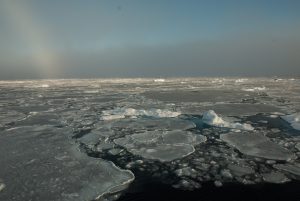Arctic innovators: Training a new generation of leaders

The public conversation about the Arctic, as reflected in global news coverage, often gets stuck on the dramatic, even dire, new challenges the region—and the rest of the world—face from the warming effects of global climate change. Reports of record-setting low sea ice levels that endanger the iconic Arctic symbol, the polar bear, may overshadow threats to the traditions and livelihoods of indigenous people in remote parts of the Arctic. Far too little attention is focused on development of possible solutions to the myriad practical, policy and political problems ahead, particularly the impact on some four million people living in eight nations inside the Arctic Circle.
The Arctic Innovators Program at Harvard Kennedy School provides a novel opportunity for a new generation of global citizens to engage in creative problem-solving and dialogue about this vital region and its importance to the rest of the world. The new leadership program encourages students to research a policy area of concern and develop an innovative idea over the course of a semester that might contribute to a more sustainable and secure Arctic. This year’s 14 Arctic Innovators, selected from more than 100 candidates, came from diverse backgrounds in Arctic and non-Arctic nations, from Canada to Singapore. They all recognize that what happens in the Arctic does not stay in the Arctic and want to be part of future solutions that can only be achieved through collective local, regional and international efforts.
A highlight of the 2017 Arctic Innovators Program was participation in the second annual Arctic Innovation Lab, hosted at the Arctic Circle Assembly in Reykjavík on Oct. 13 of this year. The lab brought together scientists, policymakers and technical experts to discuss new ideas and policy improvements that could contribute to solving Arctic challenges, with an eye toward turning some of those problems into opportunities over time. The lab provided a chance for graduate students and young professionals from HKS and four other universities—the Iceland School of Energy at Reykjavík University, the University of Greenland, the Fletcher School at Tufts University, and the University of Iceland—to present their ideas to experts, receive feedback, and further develop their solutions.
The Arctic Innovators Program is part of a new Arctic Initiative at the Harvard Kennedy School. In addition to developing a new generation of leaders with greater knowledge of the factors affecting the Arctic, the initiative will spearhead new research on topics at the intersection of environmental conservation and economic development and convene policymakers, scientists, and politicians to discuss key Arctic issues. This initiative, launched in the fall of 2017, is supported by two programs at HKS’s Belfer Center for Science and International Affairs: the Environment and Natural Resources Program, led by Henry Lee and Amanda Sardonis, and the Science, Technology, and Public Policy Program, co-directed by John P. Holdren, former science advisor to President Obama, and Daniel Shrag.
In coming weeks, students in the HKS Arctic Innovators program will share some of their ideas through a series of op-eds in Arctic Today. On the technology side, expanding access to high-speed internet and digital jobs, as well as the use of drones to support remote Arctic communities, is a critical path to their future. Providing negotiation training and meaningful consultation with indigenous leaders on economic and environmental issues would improve local input into Arctic decision-making. Developing sustainable city food systems in Iceland and other Arctic countries could reduce dependence on costly, emission-producing imports. A photo slideshow on marine wildlife urges greater environmental protection in Arctic waters.
One student advocates building an Alaska deepwater port for economic development and national security. Another encourages oil companies to drill for renewable geothermal energy. Others suggest institutional mechanisms to help the region at large: an Arctic clean development mechanism; a regional free trade agreement; or a climate displacement fund. On the political side, reasserting American leadership in the Arctic, which has been undermined by the Trump administration, is a high priority. All of the Arctic innovators recognize that the best answers for meeting challenges in the Arctic may not even exist yet. But the public conversation should expand to encourage the discussion, development and implementation of potential Arctic solutions for the benefit of all.
Halla Hrund Logadóttir, co-founder of the Harvard Kennedy School Arctic Initiative and head of the Arctic Innovators Program, is a former director of the Iceland School of Energy at Reykjavík University. Science journalist Cristine Russell is a Belfer Center/ENRP Senior Fellow and HKS Adjunct Lecturer in Public Policy.
